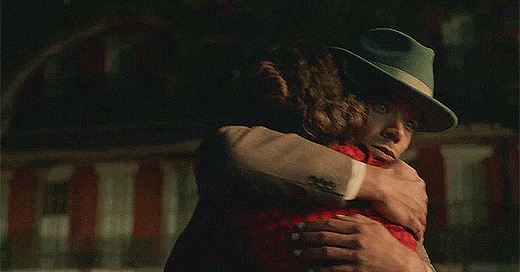Chapter 8: Interview With The Vampire, Episode 6: "Like angels put in Hell by God"
Can our beloved vampire family ever be the same, or will Lestat's old habits return to tear them apart?
“Are we the sum of our worst moments? Can we be forgiven if we do not forgive others ourselves?” — Louis de Pointe du Lac

Welcome back to the sixth and penultimate episode of my Interview with the Vampire recap for Spooky Season 2023! If you need a refresher of episodes one through five, please skim through the archives!
[spoilers from here on]
In the aftermath of the last episode, Louis narrates the repercussions and his healing process to Daniel. Louis asks this thoughtful question (quoted above), but has he forgiven Lestat? He seems to be mostly forgiving in the present day, even missing Lestat at times. Daniel asks about the “Cloud Gift” and Louis explains that he thinks Lestat kept this power to himself because if he shared it, Louis would never truly feel his equal. We all have a little Lestat Stockholm, but I am not sure about this. I do believe that Lestat loves Louis greatly, of course, but he’s also very calculated. Lestat could have kept this power locked away from Louis and Claudia intentionally. When Louis brings it up later in the episode, Lestat reacts as though it was not intentional.
Back in New Orleans, Claudia rehabilitates Louis from his wounds, bringing them closer or as some might say, “trauma bonding.” This might be an actual example of trauma bonding versus the way the internet throws that around these days. I’ve said this before, but they are sweet together, and Claudia’s willingness to stay to take care of him over so much time, despite her itch to see the world shows what Louis means to her. They tease us for a moment, Louis digging for information about Bruce, even just his name. Wouldn’t we love to see Louis take Bruce out or get vengeance for Claudia? But that isn't this kind of story, and maybe the writers didn’t want to go down that trope. Louis is so sweet here, I want to hug him. I have to give credit to Jacob Anderson again (and the writers) for creating such a wonderful version of Louis.
Lestat has only pushed them closer to each other and himself further away from their family. This is what unresolved trauma and tempers can do to close relationships even when that is not the intention. It’s no excuse, but Lestat acting and reacting out of fear brought them to this place that hurts all three of them. Some might say Lestat wants Louis all to himself, but there was a time when the three of them enjoyed each other’s company. Louis and Lestat both have things to work on—Louis’ depressive episodes clash with Lestat’s short fuse and his melancholy impacts Lestat and Claudia. In addition, if Lestat had the patience to parent and mentor Claudia, things would be better. These are all very damaged people doing their best (and worst) in each other’s presence, with each other, and all they have is each other. Well, except Lestat, who’s clearly been with Antoinette, but we’ll get there.
“I’m nothing without you. I’m nothing without both of you… This silence is cruel. And you were never cruel, Louis.” — Lestat de Lioncourt
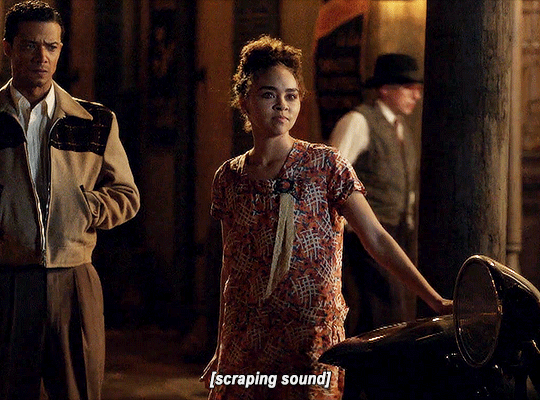
Three years later Lestat comes bearing gifts. He tells them that he can’t live without them. Well, Louis, then Claudia. Louis is silent, contemplative, possibly willing to forgive. We all know he’s happy to hear these words from Lestat, but his pause is natural. His speech doesn’t work on Claudia, who looks almost excited when Lestat says that he would leave Louis’ life forever if that’s what he wanted. She returns Lestat’s prior sentiments towards her: angry and unwilling to forgive, scratching her nails on a brand new car that is meant to be a gift to Louis. Lestat could have easily reacted violently again here, but he restrains himself. Lestat and Claudia are more like each other than either of them likely realize, as Louis notes later to Daniel, and as we’ll see, this clouds how they interact with each other.
“Lestat’s relentless determination began to crack my considerable armor. Perhaps it was the modesty of the gesture, but in the spring of 1937, one broke through. He had written it himself in the music of the hour: his first composition in 100 years… The audacity of it all was matched only by its sincerity. He had made the near-perfect Valentine with one flaw. One perfectly pre-meditated flaw.”
Louis says, and one thing finally works after six years! (Which is what, 3 months in vampire time?) A song written for Louis by Lestat:
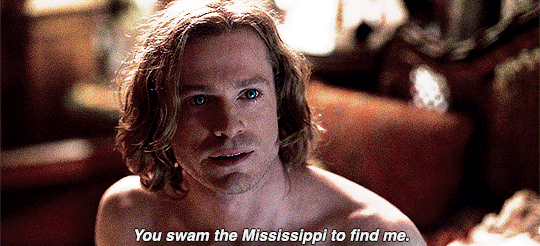
This scene is so perfect. I’m not saying it is healthy by any means, but it is full of passion and appeals to us romantics. It’s delectable and satisfying (sorrynotsorry, Antoinette). Louis and Lestat’s skin may as well be steaming during this exchange. We love it because we want to see Louis and Lestat together, happy and non-toxic, but this also has elements of the Hollywood trope of “making up.” I’m not mad about it. Come on, Loustat!
I’m not the only one who feels this way:
Yes, I do believe their love is real, albeit dark. Their relationship is toxic and dysfunctional. It was before Claudia, it is with Claudia around. I do really believe Lestat loves Louis, but there are complexities in this version of Interview with the Vampire that aren’t in other versions. To me, it’s what makes this version even more powerful. The writers did not just make Louis Black to be inclusive on a shallow level. This world feels fully lived in, the historical references throughout are accurate and well-researched, and Louis has a whole family and life outside of Lestat that we see more than one and who inform his evolution as human and vampire. So, while Lestat does truly love Louis, yes, there is a power dynamic here (as it’s been referenced before) that is imbalanced. And this scene, although still violent and toxic, shows Louis trying to take some power back. He feels that because he sought out Lestat he has the agency here, he made the choice after ignoring and burning so many other gifts.
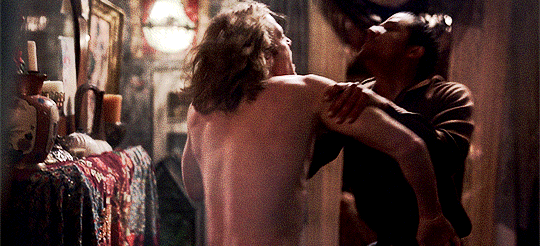
Louis blames the vampire bond for taking Lestat back after Daniel confronts him. “A bond like that makes you believe there are only two of you on the planet. Freedom and chastity wrapped in one person.” We might not be vampires, but I know we can all relate to that “only two of you on the planet” feeling, but with vampires, these intense, amorous, and twin flame-type feelings are even more intense. Lestat is excited by Louis’ return, even at the expense of Antoinette, even with the favor of violence returned by Louis. Because it’s a violence of passion the romantic in Lestat doesn’t care about the circumstances. If this is a game of chess, Antoinette is merely a pawn.
They welcome Lestat home with boundaries and rules. Claudia, who’s now wearing older-looking hairstyles, showing her maturity, sets her own: that now she will be Lestat’s sister and he’s no longer Uncle or Daddy. She makes it clear that she’s only doing this for Louis. Lestat doesn’t like the feeling of being inferior in the household and losing his power, but he’s put himself in this position by abusing it. “It’s not as simple as choosing a new family configuration,” he says, getting defensive, but the truth is, Claudia doesn’t have to put up with his abuse just because he’s her maker.
This is the most vulnerable we’ve seen Lestat, for the audience and with Louis and Claudia. We know that he’s not told even Louis this part of his history if any of it, and what he endured was quite gruesome. Then his maker, Magnus, killed themselves in front of him. Kidnapped him, stole his life, didn’t give him a choice, didn’t teach him about vampire life—it’s no wonder Lestat lives life as a predator—he had to protect himself from a young age and learn it all on his own in this traumatic way. We learn that Lestat has adapted from a place of not thinking he could live this way to doing it quite well and even enjoying it. Look how far he’s come! Well…
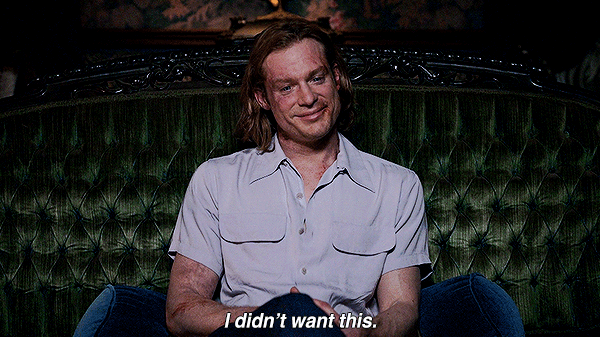
“I have a capacity for enduring. It’s why I particularly don’t like being abandoned.” — Lestat de Lioncourt
Lestat’s abandonment issues, his anger, his fear, his sadness, his pain—it’s all achingly relatable. For those of us who do relate to him, we may not physically harm others, but we can still lash out, be reactive out of fear, and hurt those around us.
Claudia isn’t as quick to forgive as Louis. She’s endured trauma and abuse too. Like Lestat, she also didn’t get to choose. It’s realistic that someone who’s endured this abuse would be less likely to accept an apology just because the abuser has been through trauma. It’s not wrong of Claudia to expect better of him, especially after a century to process what happened to him.
“It was an awkward time. I loved Claudia with all my heart and I loved Lestat with a wounded one. The work would be convincing the two to find room again for each other. Concessions would be needed. I would have to lead by example.” — Louis de Pointe du Lac
Louis is once again in the middle of their bickering. Lestat notes that she is a wall, and even though Louis is ready to move forward, it’s not long before Claudia and Lestat trade jabbing witticisms. Lestat makes efforts to be sincere with no reception. Even when they agree on what to eat, together in agreement against Louis, she rejects him. Louis knows he must compromise with the two strong personalities he’s caught between to have peace, but Louis’ compromise is not enough.
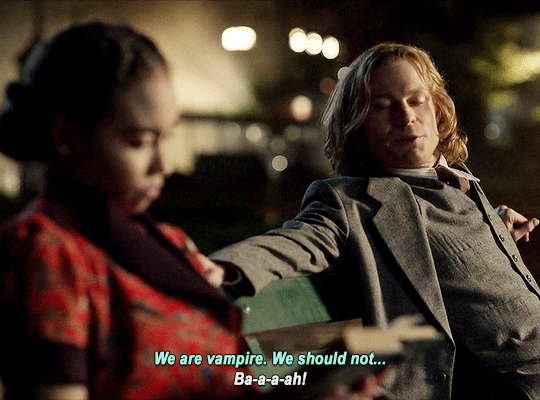
Killing Antoinette would show his dedication to Louis, Claudia, and their family unit in ways that he didn’t before. I think of the scene when they scold Claudia after the police search their home and Louis says, “We’re doing this together.” It didn’t feel that way before for many reasons. This would prove that he’s committed to their lives together, but he’s already shown he’s uncomfortable with their rules, feeling trapped in a box already when he said “At the risk of paralyzing this household with more compromise…”. This is not Lestat’s lifestyle. Despite choosing Louis for companionship, he’s already shown that he needs his freedom too, and the progression of this situation shows how he really feels that Claudia is the “anvil” around his ankles because she isn’t as easily controlled as Louis is. Lestat must learn that control is not love, and love requires some compromise and agreement to live in harmony.
Louis is again the mediator between Lestat and Claudia, which can be the position one takes when they force their child to endure unhealthy relationships and home life they didn’t ask for. All three of their perspectives are valid here. Lestat accurately observes that there is a darkness in Claudia that wasn’t there before she left their home for a decade. He seems compassionate with this fact, and as I’ve said before, I’m sure he does care. Unfortunately, he handles that care quite poorly, because he operates from that defensive place of hurt.
“In many ways, they were more like each other than they wanted to admit. They both sought out weakness, they reveled in the exploitation of it, and they romped with joy as I played audience to their joyless exchanges” — Louis de Pointe du Lac
Louis asks Lestat to give Claudia more time, but all more time does is make her more resentful. She pettily interrogates him over a game of chess. They talk over each other through their vicious banter. And what does Lestat do? He “goes to eat” but actually he runs off to… Antoinette, who reminds him that they don’t appreciate him like she does. Not only did he not kill her, he also turned her into a vampire, took her finger in vain, and wants to keep her in hiding when he needs her, her dreams and desires be damned. While disappointing to Louis, he can tell Lestat doesn’t love her: Lestat is mean to her too and he can’t even bear to see her finger missing. He made her out of fear and self-preservation but it doesn’t make it any less hurtful, and he’s only pushed them away further by doing this.

“He’d been told to do something, and brat that he was, didn’t like being told what to do. The effect, however, was numbing... The numbness remained, hardened somehow into a disassociative shell, a vessel of acceptance. Tortured rationalization. ” — Louis de Pointe du Lac
Claudia hopes this will finally shake Louis from his “blindness” to no avail. Louis is defeated, even his clothes look like that of an old man. We know that he has not resigned to this, but for now, he’s in this depressive slump. “…He would’ve killed her in a second if he thought I’d take him as he is, and I probably will,” he says. Louis is in a reserved state of sad acceptance, but Claudia doesn’t adopt that. She’s aching to explore the world.
Louis is falling apart, sad and small, but he wants Claudia to have the life she deserves, even if he’s accepted his fate. Their goodbye is bittersweet. She needs to live her life, not be stuck as the pawn between these two (currently) hopeless, miserable vampires. Even if we knew she wouldn’t actually be able to leave, I had hope for her nonetheless.
If Lestat killed Antoinette instead of using her as a void to fill his loneliness, he might have been okay with Claudia leaving, but we can’t say if that would have helped his and Lestat’s relationship since they had problems even before Claudia. They haven’t truly resolved anything. Louis chooses not to sit in the park and wait for the sun and endures this life another night, for Claudia, reflecting on Paul choosing to end his life on the same night as Grace’s wedding.

“Dark woods, and bridged rivers, and the lights of a city depot. Birmingham, Atlanta, Greensborough, Washington DC. She of all things on the earth deserved a nice seat and a wide window to watch the countryside blur before the glass. But it was 1939, and the only negro allowed in first class was the porter, and the negro passenger rode the rear. The negro vampire made do with what was left, which was fine with her.”
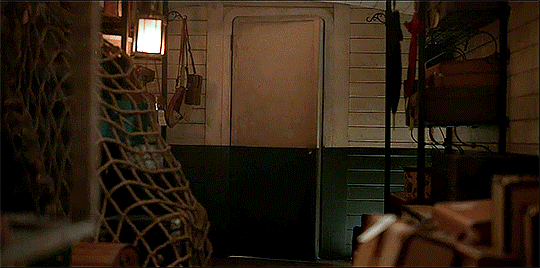
“Claudia—you left. Without saying goodbye. Again!”
Lestat is aware of Louis’ “current state,” and plays them both because of it: Louis, by pretending to care for Claudia going to Europe while war is descending, and Claudia, manipulating her emotions to return home for Louis’ sake. Lestat misunderstands or refuses to accept that Louis isn’t depressed over Claudia’s departure, although I’m sure it doesn’t help. He is distant and disassociative because of Lestat’s behavior and everything else as a result of it.
I think Lestat deep down is terrified that Louis will remain in this dreary state, that if Claudia really does leave, he truly won’t ever recover and Lestat will lose him for good. Fear is powerful, it can make us act out in truly ugly ways that aren’t true to our nature, although arguably this is his nature. We’ve seen him be so sweet, gentle, and kind—even earlier in this episode—but his ability to switch on a dime is jarring and would be frightening for those close to him.
As Claudia calls him a bastard, he projects that onto Bruce. I’d love for Lestat to defend Claudia against Bruce. “What he did to you was in very poor taste,” he says, and I desperately want him to mean it. Lestat might be a monster, but not that kind of monster, and yet, he is still using this against Claudia to invoke fear by adding on, “Can you imagine if something like that happened again? Louis would never forgive himself.”
While he’s fun to watch from a villain’s point of view, he’s also heartless and manipulative, so it’s equally upsetting to watch, especially after Louis’ sweet narration about her as she left on the train. The shift from Louis and Claudia’s sweet goodbye to the cold, harsh reality of the abusive relationships they’re in with Lestat is also sobering for the viewer. When he says, “Back in your cage, sweetheart,” he’s not only speaking to the dog but also to Claudia, showing his brutality.
“We endure each other for Louis’ happiness. So come home and make him happy. Because if you try this again, Claudia, I won’t snap your leg, defile your pocket, and zoom off on a motorbike. I’ll turn your bones to dust.” — Lestat de Lioncourt
…Oh. A worse monster? I mean, yikes! Threatening his own in such a vicious way? Yes, he’s horrible and disappointing in these moments, but man, if he isn’t a delicious villain. It’s great to get these horror moments outside of the melodrama because it is technically horror. He does this in such a creepy and campy way. He’s insane! Well done, Sam Reid.
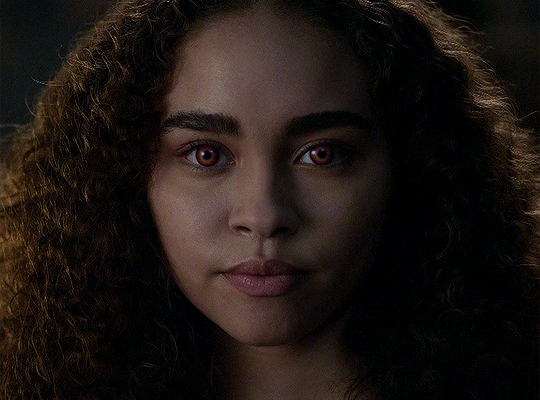
Naturally, Claudia is determined to be free of this monster, especially after the train incident. Back to another chess game, Claudia plays with Lestat. She plots beyond what Louis realizes she’s capable of. “I’m done endurin’” she tells Louis telepathically. He desperately tries to talk her off this ledge, fearing Lestat’s retaliation, but it seems she has made up her mind. Lestat is so caught up in winning this game that he doesn’t notice the body language of the two around him. While she and Lestat spoke over each other in their previous game of chess, this time she lets him talk to himself and taunts him with her silence.
While Louis is justifiably stressed over world events, remaining connected to his humanity at this point, Lestat and Claudia are consumed by what’s right in front of them. This scene is genius because of how Lestat and Claudia are behaving, the use of this chess game in front of them, and what Lestat is saying while Claudia is speaking to Louis. Talks of the bishop can’t be ignored, the rook protects the queen, pawn sacrifices, queen on one side, rook on the other, her queen is neutralized, despite her “very spirited effort.” They’re not only playing literal chess, they are playing chess with each other, and Claudia just won. Will she also succeed at killing him, or will it be a “very spirited effort”?
She doesn’t complete her part in the game, getting the best of Lestat’s temper again. Louis can’t take it anymore, literally has his hand on his heart, and turns up the radio to drown out Lestat’s yelling. While I may not be down for the passive, succumb-to-depression life, I feel for Louis here because I’m sure this moment is triggering and fearful for him. If they don’t maintain control, history could repeat itself.
Louis and Claudia’s best ally in this situation is that Lestat can’t read their minds. Which, honestly, would waterboard my insecurities and fears, so maybe they do for his too.
When we transition back in time via Daniel’s dream, that shot of San Francisco is nearly identical to the opening credits of the 1994 film. I think this particular screenshot is from the movie, but it’s essentially the same image. Except that in the show this transitions into Polynesian Mary’s, the bar where Daniel and Louis met in show lore, which, fun fact: used to be a real gay bar south of Tenderloin. Just some fun trivia that most of you probably already know if you’ve made it this far.
The pace changes to Daniel’s dream and we finally get to see a glimpse of their first encounters. Considering it’s a dream sequence, we don’t know if this is real or not, but it sure feels like it is, despite Rashid’s appearance. ‘70s Daniel is a lot softer, less rugged and quippy, more sincere—more young and unseasoned, obviously. ‘70s Louis, or at least how Daniel views him, is playful. I really love Louis here. He seems free, happy-go-lucky in a sense, which is very different from early 20th-century Louis and present-day Louis. I want to know this version of Louis more in his baby blue leisure suit and afro! Come on, Groovy Louis!
He says, “I did a terrible thing once,” and we don’t know what that is yet. Is it killing Lestat? As someone who knows the story further past this point, is it something else? Claudia’s not with him, but… Rashid is? It must be a dream!
This all leaves us with more questions than answers but stirs the pot in a fun way that is intriguing, and I can’t wait to find out more.
Your turn…
Do you really think Lestat would call it The Cloud Gift? I don’t recall reading this phrase so far in the book, but this sounds like some other character I cannot mention until the next episode.
Do you think Lestat kept his ability to fly to himself for Louis’ sake to feel his equal, or for secretive selfish Scorpio reasons?
Do you think Lestat is acting out of fear or is he truly that cruel? Maybe both?
“Are we the sum of our worst moments? Can we be forgiven if we do not forgive others ourselves?” What do you think?
Would you be like Louis and forgive Lestat or like Claudia?
Why would Lestat stop Claudia from leaving? Why bother trying so hard to come home and then not even fully come back? What’s his purpose? Revenge? Or have his feelings changed and he’s not so in love with Louis anymore?
Would their relationship have improved once Claudia left, or would Louis continue to be depressed and unable to be present, and Lestat neglectful of his feelings and needs?
Can Louis truly not fly now? The way he said “no” wasn’t convincing to me. 👀 Not all vampires have the same powers, but they all seem to be able to do some variation of this, so why not Louis too?


